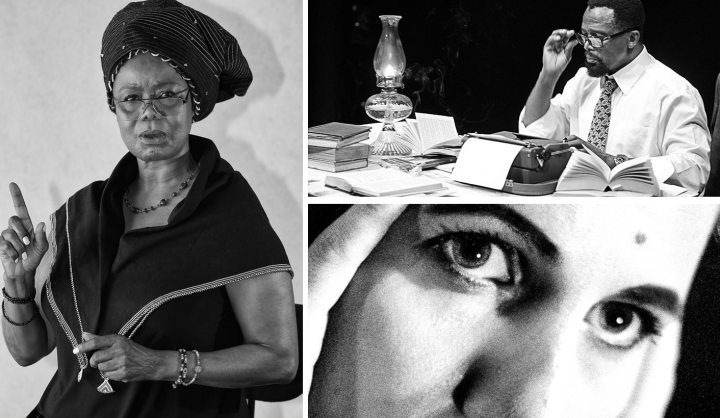Maverick Life
Grahamstown ArtsFest: Ruth First, Albertina Sisulu and Can Themba come to the stage in key new works

The moment has come for us to revere our national treasures, to place them on the stage and pick through their lives and their relevance to us. A trio of new works at the National Arts Festival in Grahamstown separately look at the lives and struggles of Albertina Sisulu, Can Themba and Ruth First, three icons of, particularly, the earlier struggle years. TONY JACKMAN was there.
The opening weekend of this year’s annual National Arts Festival in “Creative City” Grahamstown saw three arresting plays – two of them solo theatre, the third a workshopped three-hander – with a focus on three of the greatest South Africans of the Struggle years:
- Jackie Rens in Ruth First: 117 Days, an adaptation by Fred Abrahamse and Marcel Meyer of 117 Days, First’s account of her incarceration by the apartheid regime in 1963, which was published two years later; directed by Abrahamse.
- Sello Maake kaNcube in The House of Truth, a biographical play about Can Themba, the teacher-turned-journalist and political thinker (although never a politician), written by Siphiwo Mahala to commemorate the centenary of the University of Fort Hare, of which Themba was an alumnus; directed by Vanessa Cooke.
- Thembi Mtshali-Jones in Oomasisulu, a workshopped adaptation by the company of an original script by Dr Sindiwe Magona, based on Elinor Sisulu’s biographical novel about the venerable Albertina Sisulu’s life and struggle. Also in the cast are Indalo Stofile and Chuma Sopotela.
It’s possible that these works were chosen for airing at the festival before many of the recent events that have shaken the nation to its core. Whether planned or not, the material in all three plays has relevance for us today, as South Africans face an era that has many of the dark characteristics of another time, and another struggle, but in the same place. Right here and, chillingly, right now. Only the players and the specific themes are different.
The core difference of course is that there is no apartheid dragon to slay today; no equivalent for the new generations of the draconian laws dividing races and suppressing the masses. But a dragon is a dragon, and even if today’s beasts may seem a little tamer and their breath not quite so hot, they need to be slain anyway, if we are not to be the ones to be singed or worse. But we do not know the future; we do not know where we are going. And through works such as this trio, we need to look back not just in anger at what happened before, but in fear of what yet may happen. The theatre and other arts are there to light the way and, in these instances, to remind us of what was, and what might be.

Ruth First spent successive spells in jail under the ‘90 day law’ under which the apartheid regime detained those they saw as opposing their ways. We find First in prison in 1963 in a chilling and moving piece of theatre which uses clever props (stacked cages containing props representing others so incarcerated, whether on the island, in Pretoria Central or elsewhere), lighting (a very bright torch which Jackie Rens uses to light her face, and bare lightbulbs in each cage) and sounds and voices (the clanging of other cells gates, a dripping tap, the voice or her persecutor).
Her “new home” has no comforts, no scissors, no books, nothing to distract her from her persecutors’ intention: that by bald isolation she will be worn down and tell them what they demand to know: “What were you doing at Rivonia?” Her enemy is cruel and persistent, a very accurate reflection of what the likes of Verwoerd and his successor BJ Vorster were like. We are far more familiar today with Vorster’s own successor, PW Botha, but Vorster was a more terrifying man yet, and history has yet to show him in his true awfulness.
I liked what Abrahamse and Meyer did with their source material, 117 Days, First’s own account of her incarceration published in 1965, two years after her release. Jackie Rens’ performance is careful and nuanced, with much to recommend it, though it lacked the gravitas I would have liked to have found in a portrayal of a woman with the depth and character of Ruth First.

In The House of Truth, we find Can Themba in the space where he wrote, thought, drank whiskey and gathered the minds of other intellectuals and like-minded thinkers of the day. His ilk were the Drum magazine league of journalists with swagger and opinion. The Nat Nakasas, the Bloke Modisanes, the Henry Nxumalos. The Drum Boys rocked the boat, and Can Themba was invited into the fold.
The actor walks us through aspects of Themba’s life; incidents with gangsters and his friend Stompie who calls himself “a redistributor of wealth”, his love affair with alcohol, his battles with education authorities over his ability to teach, his reluctance to be a part of the political hierarchy despite being invited by no less than Mandela himself, and his short story writing. There’s much to elucidate but you do not come away feeling that you have got to know Can Themba; certainly, for me, nothing like I imagine him to have been.
The difficulty here is that we have the venerable Sello Maake kaNcube portraying Themba as a wise older fellow with gravitas and an avuncular manner, and the actor turns in some fine work on this stage, but I doubt that Themba was anything like that. He seems here to be almost an older statesman looking back, yet Themba died in 1968 at the age of just 43. The actor is 56, and he has the gravitas to show it. If anything, he seems to be playing Themba as he might have been touching 60. It just doesn’t gel.

The third play, Oomasisulu, is the one that truly captured its focal character. With Thembi Mtshali-Jones, you could believe that Albertina Sisulu was right there in front of you, on stage in her wheelchair or standing up to play her younger self, the young woman who met Walter Sisulu and became a part of the very heart of the Struggle story. Sisulu was a great lioness of the Struggle, following her husband into a world of men who did not necessarily embrace women in what they saw as their own fight against the apartheid regime.
This is a workshopped production by Artscape, and brilliantly so. From the visual styling of the set, the projections and the costumes to the writing, direction and the top-drawer acting by the trio of performers, this is a work that truly does justice to its subject matter and provides what I hope will be many, many audiences with rich material to think about in a thought-provoking and yet entertaining way.
The performers swap characters at will, and very cleverly and effectively. One young woman is suddenly Mandela, the other is suddenly Sisulu herself; or they are a cantering horse, or a younger sibling of the teenage Sisulu.
We are walked from 1918, the year of the flu epidemic, through the ‘40s, the ‘50s with the rising of women against the dompass, and into the ‘60s and arguably the worst suppression of the Sisulus and of course others in the ANC hierarchy. It is truly trenchant stuff, and brings home very effectively what the times of her life must have been like, while showing her resilience and – appropriately here – her gravitas. Cape Town, you need to see this one. DM
Photo: (From left clockwise) Thembi Mtshali-Jones in Oomasisulu, a workshopped adaptation by the company of an original script by Dr Sindiwe Magona, Sello Maake kaNcube in The House of Truth, a biographical play about Can Themba, Jackie Rens in Ruth First: 117 Days, an adaptation by Fred Abrahamse and Marcel Meyer.

















 Become an Insider
Become an Insider